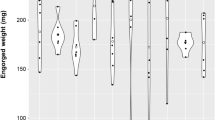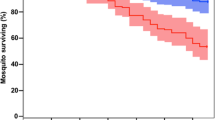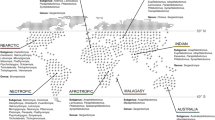Abstract
SINCE it was first shown that Toxoplasma infections may occur naturally in some birds (notably pigeons and chickens) there has been considerable speculation on the possible role of wild birds as host reservoirs for human Toxoplasma infections.
This is a preview of subscription content, access via your institution
Access options
Subscribe to this journal
Receive 51 print issues and online access
$199.00 per year
only $3.90 per issue
Buy this article
- Purchase on Springer Link
- Instant access to full article PDF
Prices may be subject to local taxes which are calculated during checkout
Similar content being viewed by others
References
Garnham, P. C. C., Parasitology, 40, 328 (1950).
Author information
Authors and Affiliations
Rights and permissions
About this article
Cite this article
LAINSON, R. Some Observations on the Life-Cycle of Atoxoplasma, with Particular Reference to the Parasite's Schizogony and its Transmission by the Mite Dermanyssus gallinae. Nature 182, 1250–1251 (1958). https://doi.org/10.1038/1821250a0
Issue Date:
DOI: https://doi.org/10.1038/1821250a0
This article is cited by
-
Coccidia of New World passerine birds (Aves: Passeriformes): a review of Eimeria Schneider, 1875 and Isospora Schneider, 1881 (Apicomplexa: Eimeriidae)
Systematic Parasitology (2011)
-
Proliferative visceral Isospora (atoxoplasmosis) with morbid impact on the Israeli sparrow Passer domesticus biblicus Hartert, 1904
Parasitology Research (2008)
Comments
By submitting a comment you agree to abide by our Terms and Community Guidelines. If you find something abusive or that does not comply with our terms or guidelines please flag it as inappropriate.



